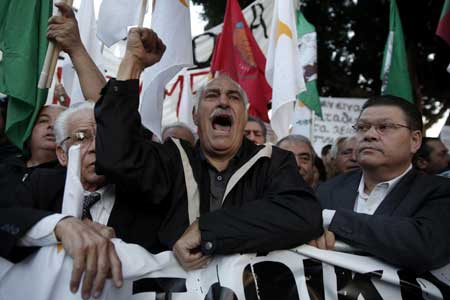 |
|
Protesters shout slogans during an anti-bailout rally outside the parliament in Nicosia March 19, 2013. |
|
Cyprus overwhelmingly rejected a proposed levy on bank deposits as a condition for a European bailout on Tuesday, throwing international efforts to rescue the latest casualty of the euro zone debt crisis into disarray. The vote in the tiny legislature was a stunning setback for the 17-nation currency bloc, angering European partners and raising fears the crisis could spread; lawmakers in Greece, Portugal, Ireland, Spain and Italy have all accepted austerity measures over the last three years to secure European aid. With hundreds of demonstrators outside the parliament chanting "They're drinking our blood", the ruling party abstained and 36 other lawmakers voted unanimously to reject the bill, bringing the Mediterranean island, one of the smallest European states, to the brink of financial meltdown. Finance Minister Michael Sarris had already headed to Moscow, amid speculation Russia could offer assistance given the high level of Russian deposits in Cypriot banks. President Nicos Anastasiades, barely a month in office, spoke by phone with Russian President Vladimir Putin after the vote. Anastasiades was due to meet party leaders at 9 am on Wednesday to explore a way forward. "The voice of the people was heard," 65-year-old pensioner Andreas Miltiadou said among a crowd of demonstrators jubilant after the vote. EU countries had warned they would withhold 10 billion euros ($13 billion) in bailout loans unless depositors in Cyprus, including small savers, shared the cost of the rescue, an unprecedented step in the stubborn debt crisis. The European Central Bank had threatened to end emergency lending assistance for teetering Cypriot banks, which were hard hit by the financial crisis in neighboring Greece. The island's partners barely disguised their anger. Euro zone paymaster Germany, facing an election this year and increasingly frustrated with the mounting cost of bailing out its southern partners, said Cyprus had no one to blame but itself for the gravity of the situation. |
塞浦路斯议会周二以压倒性多数票拒绝了以征收存款税为附加条件的欧元区援助计划,国际社会为拯救塞浦路斯这个欧债危机最新“遇难国”所付出的努力也陷入泥淖。 塞浦路斯议会的投票令拥有17个成员国的欧元区深感挫败,惹恼了欧洲伙伴,也让人们更加担心危机会扩散。在过去三年中,为确保获得欧洲援助,希腊、葡萄牙、爱尔兰、西班牙和意大利都接受了紧缩措施。 数百名示威者在议会外高喊“他们在吸我们的血”,执政党投票弃权,其他36名议员一致投票反对,这将这个地中海岛国,也是欧洲最小的国家之一推向金融崩溃的边缘。 塞浦路斯财政部长米歇尔•萨里斯已经前往莫斯科,有猜测认为俄罗斯会对塞浦路斯提供援助,因为俄罗斯在塞浦路斯有大量存款。塞浦路斯总统尼克斯-阿那斯塔西亚迪斯就职仅有一个月,在投票后他与俄罗斯总统弗拉基米尔•普京进行了通话。 阿那斯塔西亚迪斯原定于周三上午9点与政党领袖会面,提出解决措施。 65岁的养老金领取者Andreas Miltiadou 在投票后说:“人民的声音得到了倾听。”当时他正在和一群示威者欢呼。 欧盟国家在投票前提醒说,除非包括小储户在内的塞浦路斯存款人分担救助成本,否则将不会发放100亿欧元(130亿美元)援助贷款。而这在难以处理的债务危机中是前所未有的举措。 欧洲央行也威胁将停止对该国受困银行发放紧急贷款援助。塞浦路斯的银行受到邻国希腊金融危机的严重打击。 欧盟国家毫不掩饰它们的愤怒。 欧元区出资大国德国表示,对目前严峻的形势而言,塞浦路斯不能怪罪任何一方,只能怪自己。德国今年将迎来选举,对于救助南欧伙伴国的高昂代价愈发感到不满。 相关阅读 (中国日报网英语点津 Julie 编辑:陈丹妮) |
|
Vocabulary: paymaster; 出钱操纵者;后台老板 |
